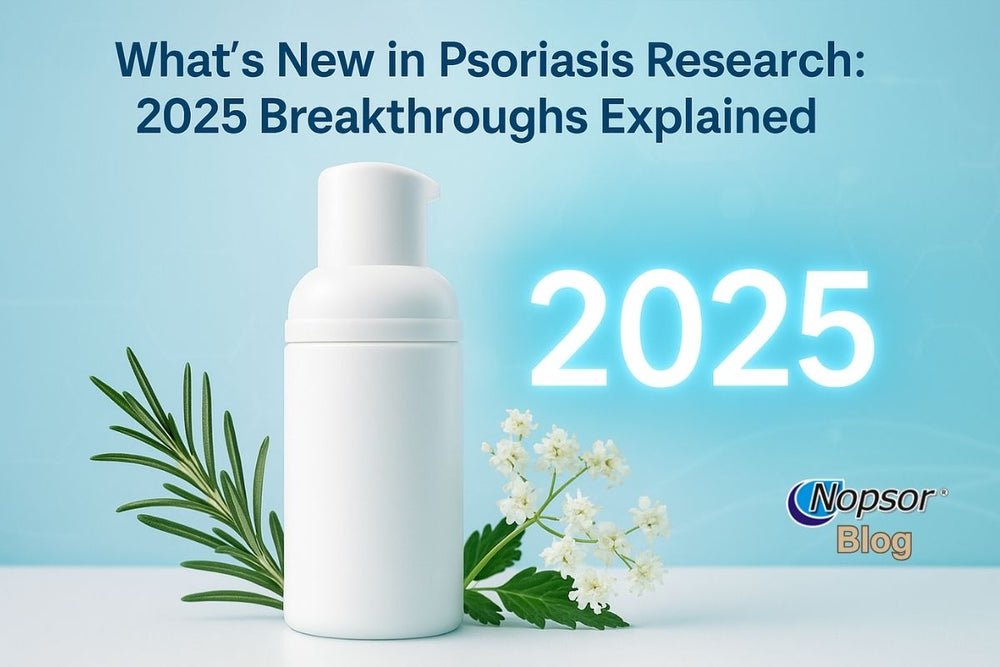What’s New in Psoriasis Research: 2025 Breakthroughs Explained

Real Hope Is Here! But It’s Not What You Think
In 2025, the conversation around psoriasis is changing. Not because we’ve found a magic cure, but because we’re finally seeing treatments that are safer, smarter, and more personalized than ever before.
From FDA-approved topicals like roflumilast foam to promising research into the gut-skin connection, the latest science is moving us beyond temporary relief and into long-term control with fewer risks and more natural support.
1. Roflumilast Foam: A New Topical with Big Impact
In May 2025, the FDA approved roflumilast foam and cream as the first branded topical for plaque psoriasis on both scalp and body, for adults and adolescents (12+).
-
Why it matters: Unlike steroids, roflumilast is a non-steroidal phosphodiesterase-4 (PDE4) inhibitor, targeting inflammation without skin thinning risks.
-
Good for: Sensitive areas (scalp, folds), long-term use, and steroid-wary patients.
-
Reality check: It’s not natural and it’s not for everyone. But it’s a major step for those who haven’t responded to older topicals.
2. Natural Remedies Under the Microscope: Magnesium, Coal Tar, and Herbal Blends
2025 continues a trend of scientific interest in natural solutions. While steroid creams remain common, more patients and researchers are asking: Can we do better with plants and minerals?
-
Magnesium & Psoriasis
-
Early research shows magnesium baths may reduce inflammation and scaling.
-
Supplements? Still inconclusive, talk to your doctor before trying.
-
-
Coal Tar Is Still on the Map
-
Long used, coal tar is making a comeback due to low resistance and nighttime efficacy, especially when paired with salicylic acid (as seen in Nopsor's shampoo and pomade system).
-
New formulations avoid strong odors and skin staining.
-
-
Herbal Blends Gaining Clinical Respect
-
Ingredients like rosemary, oregano, and saponaria officinalis (all found in Nopsor) are being studied for their anti-inflammatory and wound-healing properties.
-
3. Gut Health and the Psoriasis Connection
One of the most talked-about 2025 topics: the gut-skin axis.
-
What the science says: Imbalances in gut bacteria may worsen inflammation in autoimmune diseases including psoriasis.
-
What's new: Small studies suggest probiotics and anti-inflammatory diets (like gluten-free or low-starch) could support symptom reduction.
-
Next step: Larger trials are underway to confirm if changing your gut flora can calm your skin.
4. AI in Dermatology: Personalized Psoriasis Management
AI isn’t just generating images, it’s now helping dermatologists:
-
Scan lesions with accuracy
-
Predict flare-ups based on personal data
-
Match patients to treatments based on digital skin records
It’s not mainstream yet, but AI-powered diagnosis tools and skin trackers are on the rise, especially for people managing psoriasis remotely.
5. Biologics, Biosimilars & Beyond
Biologic injections are still a gold standard for moderate-to-severe psoriasis. What’s new in 2025:
-
More biosimilars: Lower-cost versions of name-brand biologics (like Humira or Stelara) are gaining FDA approvals.
-
New targets: Some research focuses on blocking specific cytokines with even fewer side effects.
-
The takeaway: These are powerful but expensive and often reserved for those with joint involvement or severe cases.
Final Word: Relief Is Closer, But It's Still Personal
While there’s still no “cure” for psoriasis, 2025 brings a clearer path to control. Whether you’re seeking a science-backed natural solution like Nopsor, or navigating the newest prescriptions with your dermatologist, the key is knowing your options and listening to your body.
References
-
Coal Tar Treatments in Psoriasis
→ DermNet NZ – Coal Tar
🔗 https://dermnetnz.org/topics/coal-tar -
AI in Dermatology: Future of Diagnosis and Care
→ Nature Medicine – Artificial Intelligence in Dermatology: A Review
🔗 https://www.nature.com/articles/s41591-020-0942-0 -
FDA Approval of Roflumilast Foam (Zoryve) for Psoriasis
→ Drugs.com – Zoryve (roflumilast) Approval History
🔗 https://www.drugs.com/history/zoryve.html -
Magnesium and Psoriasis: Emerging Clinical Insights
→ PubMed – “Role of Magnesium in Skin Disorders: A Focus on Psoriasis”
🔗 https://pubmed.ncbi.nlm.nih.gov/39485525/ -
Gut Health and Psoriasis: The Skin-Microbiome Link
→ PubMed Central – “The Gut Microbiome and Psoriasis: A Review”
🔗 https://pmc.ncbi.nlm.nih.gov/articles/PMC9321451/


Leave a comment
Also in Psoriasis Research and Trends
Is There a Permanent Cure for Psoriasis on the Horizon?
August 13, 2025
Is a cure for psoriasis finally in reach? Explore the research behind gene therapy, gut health, AI, and more in our deep dive on long-term relief.
Continue reading
How Close Are We to a Psoriasis Cure? A Look at the Latest Research
June 24, 2025
Is a psoriasis cure finally possible? Explore the latest breakthroughs in genetics, biologics, and gut health that bring us closer than ever.
Continue reading